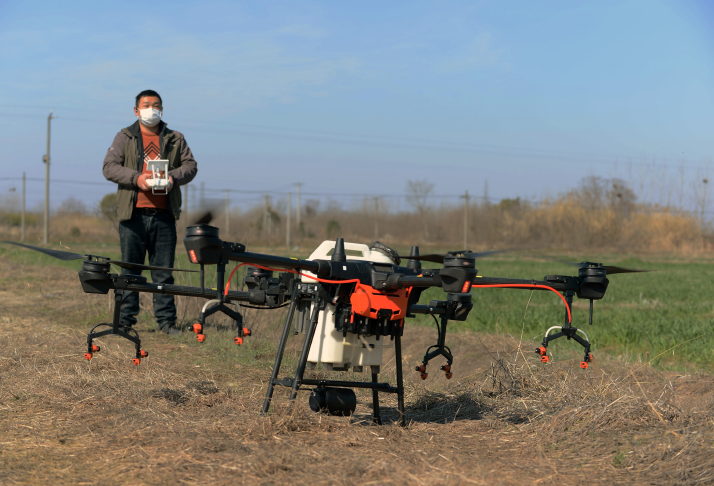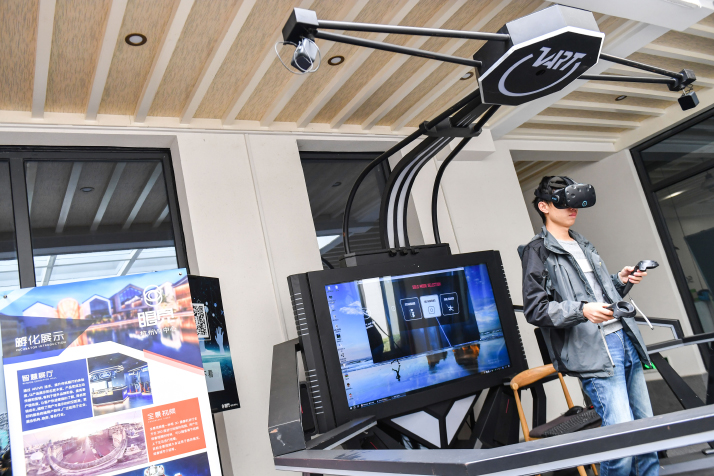| Business |
| More New Professionals on the Block | |
| China unveils 16 new occupations to keep pace with economic and technological development | |
|
|
 A staffer operates an unmanned aerial vehicle to do sprinkling in Feidong County, Anhui Province in east China, on February 18 (XINHUA)
In a hospital in Jingmen City, Hubei Province in central China, Xu Peifeng intently watched the monitor of a ventilator, which was pulsing with waves and graphics. He needed to adjust the ventilator to provide patients with oxygen when they were unable to breathe on their own. "We must fully understand the condition of patients' lungs before we set the parameters to help them," Xu said.
The respiratory therapist from the Sir Run Run Shaw Hospital affiliated with Zhejiang University School of Medicine in Zhejiang Province in east China came to Jingmen as a member of a medical team to support local hospitals amid the outbreak of the novel coronavirus disease (COVID-19). These therapists have provided life support in the treatment of COVID-19. At present, a large number of respiratory therapists like Xu are working at the frontline to assist doctors and provide personalized respiratory treatment to patients, especially those in critical condition. By formulating appropriate treatment plans, they help improve the recovery rate of critical patients. Xu's profession was among the 16 new ones given official recognition in a statement jointly issued by the Ministry of Human Resources and Social Security (MOHRSS) and other departments on February 25. As the Chinese economy shifts toward high-quality development, new jobs requiring new skills and knowledge have emerged in various industries in recent years. "The core driver of new professions is, first and foremost, the explosion in demand," Chen Yu, Director of the China Institute for Occupation Research at Peking University, said to Guangming Daily, adding that with people's increasing demand for high-quality life and consumption, more occupations will be generated in fields such as modern services.  A VR designer tests his product at Hangzhou Dream Town, Zhejiang Province in east China, on November 2, 2018 (XINHUA)
New forces After finishing their daily work at the frontline, Xu and his colleagues also provide short-term training in respiratory treatment to other medical workers at designated hospitals. According to the MOHRSS, specialized respiratory therapists are urgently needed in China. The 16 new professions also include intelligent manufacturing technicians, industrial Internet technicians, virtual reality technicians, supply chain managers, artificial intelligence trainers, and all-media operators, according to the statement. Some have already become irreplaceable forces in the nationwide battle against COVID-19. Built and delivered in just 10 days, Huoshenshan, the specialty hospital to treat patients infected with the virus, demonstrated the strength and speed of construction in China. Another hospital, Leishenshan, was later delivered on February 8. The successful construction of the two hospitals in such a short period of time can be largely attributed to prefabricated building constructors. The facilities consist of prefabricated units that can be built offsite and then assembled in place to save time. The modules are separated by outdoor spaces and connected by corridors. During this period, a large number of workers played their part by installing components and contributing to the progress of the project. In addition, intelligent robots have been assisting medical workers to provide remote diagnosis, online medical consultation and medicine deliveries to hospitals. They conduct remote nursing and temperature monitoring, which reduced the risk of cross-infection. But since robots cannot perform on their own, behind them are intelligent manufacturing technicians and artificial intelligence trainers. Drone operation and maintenance personnel have also done their part as the country has deployed drones to carry out diversified epidemic prevention and control tasks such as broadcasting messages about how to take protective measures and spraying disinfectants in public areas. More job opportunities The new professions are mainly in emerging industries and modern services, which are fresh growth points in China's economy and new driving forces for improving its high-quality development, Mao Tonghui, a commentator with Xinhua News Agency, said. According to a guideline on developing the digital economy to stabilize and increase employment issued by the National Development and Reform Commission in 2018, the digital economy will become an important channel to provide jobs by 2025, as the sector continues to grow. Lai Youwei, head of Meituan Research Institute, the scientific research arm of Meituan-Dianping, one of China's major online food delivery and ticketing service platforms, said the updated occupation list will encourage enterprises and players in the digital economy to provide more job opportunities. For employees, it will enhance their confidence and help them to get jobs. Affected by the epidemic, many stores, restaurants and entertainment outlets around the country have suspended operation since the Spring Festival, and many people in the service industry have begun to work as part-time delivery personnel. On February 3, Hema Fresh, Alibaba's New Retail grocery chain, took the initiative to offer part-time jobs in its stores such as couriers to idle workers from other companies. Another e-commerce platform JD.com released its talent-sharing plan on February 5, inviting employees from restaurants, hotels and other businesses that are currently closed to join it as temporary workers. Dada-JD Daojia, an online grocery and delivery company with JD.com, has reportedly recruited 35,000 employees during this period. From January 20 to February 23, the food delivery branch of Meituan-Dianping offered jobs to 75,000 people to work as delivery personnel. New forms of business such as the sharing economy and crowdsourcing have given rise to more flexible working models in China. Thus, an updated job list has become increasingly urgent in order to give people more recognition in society and help them get more professional training, Lai said. It is also conducive to promoting vocational education and training reform. Colleges and universities will be encouraged to adapt to the requirements of new professions and upgrade their courses to help cultivate talent and build a closer connection between vocational training and social demands, he added. It will also help improve China's occupation classification and set up unified standards, according to him. People will acquire more professional skills and get a clearer vision of their future career. The new list will improve the stability of employment as well. This is the second time China has added new professions to its occupation list since 2015. The first batch of 13 new professions, including esports operator and esports player, was released in April 2019, accounting for changes in technology and lifestyle. Ma Qiji, a researcher with the Pangoal Institution, a Chinese think tank, told 21st Century Business Herald that the introduction of such professions indicates a vast demand for talent in these fields, which could also be the new direction of industrial development in the future. Copyedited by Rebeca Toledo Comments to mamm@bjreview.com |
|
||||||||||||||||||||||||||||
|